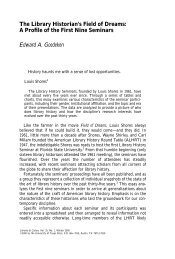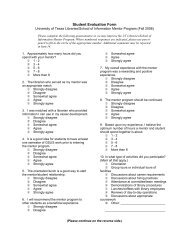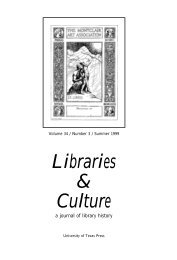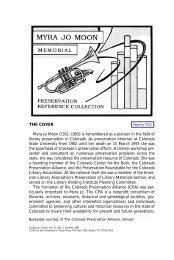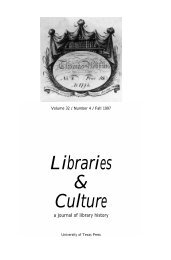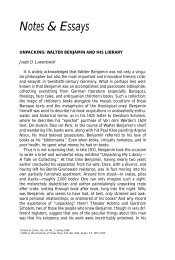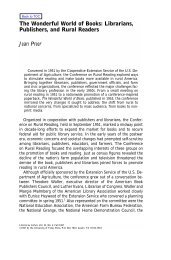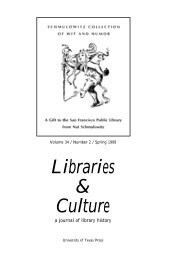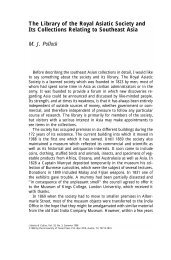Full issue (pdf file, 973 kb) - School of Information - The University of ...
Full issue (pdf file, 973 kb) - School of Information - The University of ...
Full issue (pdf file, 973 kb) - School of Information - The University of ...
You also want an ePaper? Increase the reach of your titles
YUMPU automatically turns print PDFs into web optimized ePapers that Google loves.
Shirley asked me to give a paper on “Life as a Weekend Anthologist” at<br />
the ALHRT meeting in Cleveland on 12 July 1961, when the annual ALA<br />
conference would be in progress. I was first on the program and was followed<br />
by Gerald D. McDonald (New York Public Library), who first<br />
described the Erastus Brooks Library, which had inspired two musical<br />
compositions. Following this part <strong>of</strong> McDonald’s presentation, Ralph<br />
Smith (New York Public Library) played the two compositions on the<br />
piano, to the delight <strong>of</strong> the audience. McDonald then proceeded with an<br />
account <strong>of</strong> “<strong>The</strong> Astor Library Ghost.” Jackson E. Towne (librarian emeritus,<br />
Michigan State <strong>University</strong> at East Lansing) was the third speaker<br />
with a paper on the life and career <strong>of</strong> the well-known book historian,<br />
Douglas C. McMurtrie (1888–1944).<br />
Wayne Shirley presided at the meeting. In the absence <strong>of</strong> secretary<br />
Louis Shores, who was spending the summer in England, Shirley drafted<br />
me to serve as secretary pro tempore with responsibility for preparing a<br />
report <strong>of</strong> the meeting to be published in the proceedings <strong>of</strong> the<br />
Cleveland conference. This report records that about a hundred individuals<br />
attended the meeting; in fact, 102 attended. 7 I still have the<br />
three-page “attendance roll” that attendees signed.<br />
<strong>The</strong> American Library History Round Table meetings during the<br />
Shirley/Shores years were always devoted entirely to a program—no minutes<br />
were read, no committee reports were given, no dues were collected.<br />
Unusual? Yes, but herein lay for many the appeal <strong>of</strong> the ALHRT: learn<br />
some library history and hear something “<strong>of</strong> those who were truly<br />
great”—or perhaps only near great. Any expenses the Round Table may<br />
have had (stamps, stationery, envelopes, telephone calls) were paid for by<br />
either Shirley or Shores. Shirley usually presided, opening the meetings<br />
with the greeting “Welcome, friends <strong>of</strong> American Library History.”<br />
Shores passed out a sheet or two <strong>of</strong> paper for those attending the meeting<br />
to sign. This document became the ALHRT membership roll. <strong>The</strong><br />
Shirley/Shores style <strong>of</strong> conducting Round Table meetings can perhaps<br />
best be described as a kind <strong>of</strong> formal informality.<br />
<strong>The</strong> Rush/Marshall Years<br />
When Shirley gave up the chairmanship in 1968, N. Orwin Rush<br />
(Florida State <strong>University</strong>) became chairman and continued to conduct<br />
meetings much in the Shirley manner. When Shores gave up the <strong>of</strong>fice <strong>of</strong><br />
secretary, he appointed me to be his replacement. I held this <strong>of</strong>fice for<br />
some four years (1969–72). <strong>The</strong> Round Table during the Rush/Marshall<br />
years differed very little from the Shirley/Shores years. I do not recall<br />
whether Rush and I were both ever present at Round Table meetings.<br />
When Rush was absent I assumed his responsibilities, and he assumed<br />
45



